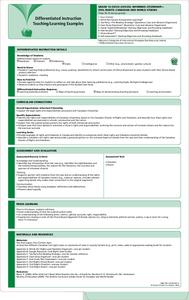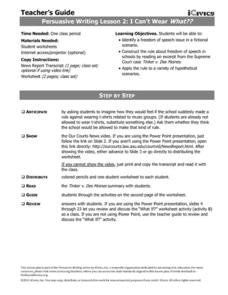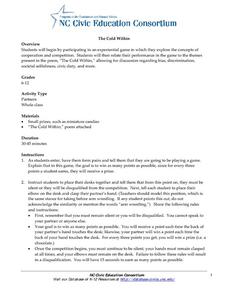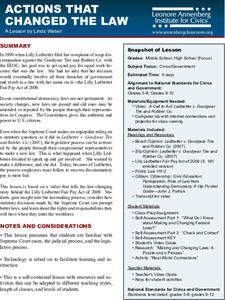Center for Civic Education
Citizenship Schools and Civic Education During the Civil Rights Movement and in the Present
Your young historians will discover the importance that citizenship education has played in the social progress of the United States as they learn about early efforts to discourage African Americans from voting in the 1960s.
Curated OER
Cyberbullying and Civic Participation
Encourage your class to create rules and regulations for cyberbullying. Learners explore civic participation by thinking about the rules and regulations already in place in their lives and studying Canada's Canada Gazette. As a final...
Advocates for Human Rights
Civic Engagement and U.S. Immigration Policy
To conclude their study of immigration and human rights, class members create a civic engagement project centered on an issue of immigration and designed to influence US immigration policy. They examine examples of attempts to influence...
Museum of Tolerance
Citizenship Then and Now: Comparing Ancient Rome and Contemporary American Society
Class members research citizenship in Ancient Rome and in the United States and use the provided graphic organizers to compare the rights and responsibilities of citizens in these two democracies.
Museum of Tolerance
The Role of Citizens in a Participatory Democracy
Groups research participatory democracies and compare the role and rights of citizens in ancient history with those in recent U.S. history. Guided by a series of questions, individuals compose a persuasive essay in which they discuss the...
Curated OER
A River Ran Wild: An Environmental History
The Nashua River serves as the focal point of an investigation of the treatment of and care for natural resources. A reading of A River Rand Wild: An Environmental History by Lynne Cherry, launches the study and class members consider...
Curated OER
Jimmy Carter: Civic Action, Lesson 2
Build on high schoolers' awareness of what's wrong with society. Here they examine Jimmy Carter's extensive involvement in volunteer action in the local, national, and global arenas. Define and explore concepts -- philanthropy, citizen,...
iCivics
Students, Engage!
Discuss as a class some problems that you would like to see changed in your school or community, and then take action! After your young citizens determine the appropriate steps they should take to accomplish their objectives, they will...
Center for Civic Education
Becoming a Voter
What are the requirements to register to vote in the United States? Young citizens evaluate this process by working with handouts, informational texts, discussion, and research, as well as complete a sample voter registration form.
Ontario
Informed Citizenship—Civil Rights
To launch a study of civil rights, class members brainstorm rules and expectations of behaviors at home, in school, in the workplace, and in sports. They then look at civil rights cases and examine the rules embedded in these cases.
Facing History and Ourselves
Life for German Youth in the 1930s: Education, Propaganda, Conformity, and Obedience
The German youth faced an onslaught of propaganda when they went to school, thanks to the Nazi regime led by Hitler during World War II. Pupils relate their education experiences to German youth by analyzing primary source readings,...
Facing History and Ourselves
The Audacity of a Vote: Susan B. Anthony’s Arrest
Susan B. Anthony's speech "Is It a Crime for Women to Vote?" takes center stage in a instructional activity that asks class members to consider how they might respond to what they consider an unjust law. Groups work through the speech...
iCivics
I Can’t Wear What?
Can schools ban t-shirts picturing musical groups or bands? Your young citizens will find out with this resource, which includes a summary of a United States Supreme Court case from the 1960s about a similar dispute over students wearing...
Center for Civic Education
What Is Authority?
Young scholars examine the concepts of power and authority as they begin learning about government in this elementary social studies lesson. Through a series of readings, discussions, and problem solving activities, children learn about...
Curated OER
Acting for the Common Goods
The first of a three-part series on bullying, this plan has class members present skits about bullying, write and sign an anti-bullying pledge, and complete a service project. For the skit, learners use information from previous lessons...
Carolina K-12
The Cold Within
“. . . one of the great challenges to humanity is acknowledging and overcoming a natural tendency to think less of and discriminate against people who are different from us . . .” Launch an examination of competition and cooperation, of...
Carolina K-12
Advocacy 101
Want a change? Become an advocate. As part of a study of the responsibilities of good citizens, class members engage in a series of role plays that model how to lobby for change.
Annenberg Foundation
Actions that Changed the Law
The Fair Play Act of 2009 came about due to the actions of one woman. Young historians research Lilly Ledbetter and what she went through to get pay equal to that paid to men for the same work at Goodyear Tire and Rubber Company. The...
Curated OER
Action Through Art
How can we make the world a better place? Help your class members become world citizens, active in philanthropy and the community around them. Use a comic book (included) to discuss the idea of philanthropy. Then, using the superhero...
Annenberg Foundation
Service Learning in the Social Studies
Active Citizenship Today (ACT) is a "unique social studies service learning program" that requires students to learn about the public policy associated with community issues they identify in their local community. This web site provides...
Delaware Law Related Education Center
Comparing Personal and Civil Responsibility in Croatia and The United States
What rights do citizens in a democracy have? Learners compare the rights of citizens in the United States and Croatia, and examine the personal and civil responsibilities that go along with those rights through a great series of...
Curated OER
Arrest- A Legal System Simulation
What would your class do if a police officer arrested a student in class? This is exactly the anticipatory set that gets students engaged in a unit on the legal system. The plan is to get the officer to simulate an arrest, and then guest...
State Bar of Texas
Baker v. Carr
Can the federal government override the state government to protect the citizens of the United States? The 1962 Supreme Court case Baker v. Carr outlines the issue of equal protection under the law. Scholars investigate with a short...
State Bar of Texas
Dred Scott v. Sandford
Who decides someone is not a real person? Scholars investigate the Dred Scott v. Sandford court case which deals directly with slavery and citizenship. After viewing a short video clip, classmates work in pairs to assess and discuss the...

























